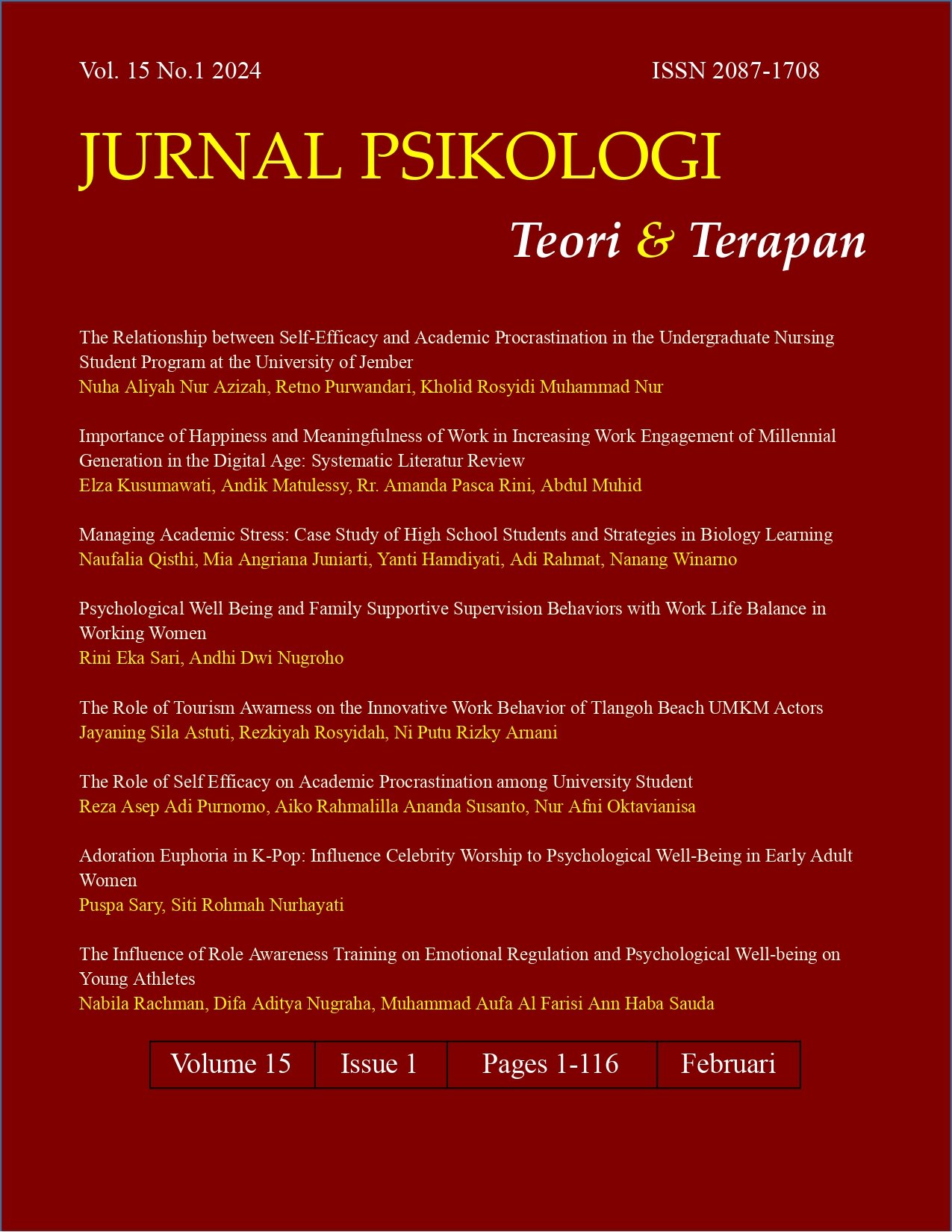Importance of Happiness and Meaningfulness of Work in Increasing Work Engagement of Millennial Generation in the Digital Age: Systematic Literatur Review
DOI:
https://doi.org/10.26740/jptt.v15n01.p16-31Keywords:
work engagement, happiness, meaningful work, the millennial generation, keterikatan kerja, kebahagiaan, kebermaknaan kerja, generasi milenialAbstract
Abstract
Background: The mixing of 3 generations (x, millennial / y and z) in the world of work raises differences in the picture of work ethos and attachment. The company has a strategy of creating superior employees. Millennial employees show a desire to be appreciated, maximize work time and prioritize mental health, so that employees can still work in happy conditions and not depressed. Objective: This research shows the importance of happiness and work meaning felt by millennial employees to increase work engagement to the global competition. Method: Systematic literature review by identifying, assessing, and synthesizing literature search results through Google Scholar, Scopus, Research Gate, and Garuda. Results: 12 literature studies show that the work attachment of millennial generation employees is at a moderate level and is still below the work attachment of previous generations. Conclusion: Companies can provide work comfort and opportunities to be actively involved in work so that a sense of meaning arises for the work done to increase employee engagement in the company.
Abstrak
Latar Belakang: Percampuran 3 golongan generasi (x, milenial/y dan z) di dunia kerja menunculkan perbedaan gambaran etos dan keterikatan kerja. Perusahaan memiliki strategi menciptakan karyawan unggul. Karyawan milenial menunjukkan keinginan untuk dihargai, memaksimalkan waktu kerja dan mengutamakan kesehatan mental, sehingga karyawan tetap bisa bekerja dalam kondisi bahagia dan tidak tertekan. Tujuan: Penelitian ini mengetahui pentingnya kebahagiaan dan kebermaknaan kerja yang dirasakan oleh karyawan milenial terhadap peningkatan keterikatan kerja pada persaingan global. Metode: yang digunakan adalah Systematic literatur review dengan mengidentifikasi, menilai dan menyintesiskan hasil penelusuran kepustakaan melalui google scholar, Scopus, research gate dan garuda. Hasil: 12 studi kepustakaan menunjukkan bahwa keterikatan kerja yang dimiliki para karyawan generasi milenial berada di taraf sedang dan masih di bawah keterikatan kerja yang dimiliki para generasi sebelumnya. Simpulan: Perusahaan dapat memberikan kenyamanan kerja dan kesempatan untuk terlibat aktif dalam bekerja sehingga muncul rasa bermakna atas pekerjaan yang dilakukan sehingga dapat meningkatkan keterikatan kerja karyawan di perusahaan.
References
Dewantoro, R. B., & Purba, S. D. (2018). Pengaruh Work Engagement Dan Job Satisfaction Terhadap Turnover Intention (Perbandingan Pada Generasi X Dan Generasi Y). Providing Working Papers Series In Management, 10(1).
Hadi, S., Tjahjono, H. K., & Palupi, M. (2020). SYSTEMATIC (D. W. P. Ranto, Ed.; Pertama). Viva Victory Abadi.
Rhamadanningrum, I. R. (2020). Pengaruh Role Conflict Terhadap Turnover Intention Pada Karyawan Kategori Generasi Milenial.
Seligman, M. E. P. (2005). Menciptakan Kebahagiaan dengan Psikologi Positif (Authentic Happiness). PT. Mizan Pustaka.
Wijoyo, H., Indrawan, I., Cahyono, Y., Handoko, A. L., & Santamoko, R. (2020). Generasi Z & Revolusi Industri 4.0 Penulis (Issue July).
Downloads
Published
How to Cite
Issue
Section
License

This work is licensed under a Creative Commons Attribution-NonCommercial 4.0 International License.
Authors who publish in this journal agree to the following terms:
Copyright in any article is held by the author.
The author grants the journal, publication rights with the work simultaneously licensed under a Creative Commons Attribution License that allows others to share the work with an acknowledgment of the work's authorship and initial publication in this journal.
Authors may enter into separate, additional contractual arrangements for the non-exclusive distribution of the journal's published version of the work (e.g., posting it to an institutional repository or publishing it in a book), with an acknowledgment of its initial publication in this journal.
Authors are permitted and encouraged to post their work online (e.g., in an institutional repository or on their website) prior to and during the submission process, as this can lead to productive exchanges, as well as earlier and greater citation of published work.
 Abstract views: 2016
,
Abstract views: 2016
, PDF Downloads: 1797
PDF Downloads: 1797


















